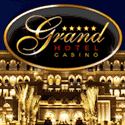Here's my take on 9/11 the way I saw it live. I had just returned from working out of town and I had the week off, and was sleeping in. My wife was watching CNN and woke me up when the first images from Manhatten were being shown on the air. I saw the whole thing from soup to nuts. Although unrelated to gaming, this topic deserves great attention and was written in its entirety by the editor of Gamingology.
Like many Americans, I watched the events of 9/11/2001 unfold on CNN and FOX (then later NBC, ABC,CBS). During the crucial first moments when the news media broke what was to be the biggest story of the decade, there was no apparent cause for concern. I was intrigued at the notion of a Cessna hitting the World Trade Center. There was no reason to doubt the story, but this was certainly an unusual development. So I was drinking my coffee waiting for them to name this freak/stroke victim/obviously dead pilot. I had watched enough news to know that usually when planes are involved, a few things are usually disclosed almost immediately. Airport of origin, time of departure, and intended destination are the norm, and usually some back- ground information.
CNN and FOX News were repeating the same sketchy account of this mystery Cessna. This is where you should focus your attention. Instead of reporting the facts, which obviously would have been extremely alarming, the exact opposite occured. Most of the free world has seen footage of the second WTC tower being impacted and the reaction from people on the ground. When the first jet impacted the WTC earlier that morning, don't you think it was equally if not more dramatic? Have you seen the footage where a fireman is giving an interview which is interrupted by a jet flying overhead and hitting a skyscraper? If you have, then that is the only known video footage of the first WTC tower being struck at 8:46AM on Tuesday, September 11th, 2001.
Inside the tower, many were killed instantly by the impact and explosion. Others were less for- tunate; trapped and/or clinging to life while burning to death and/or suffocating from the smoke and fumes created by thousands of gallons of burning jet fuel. New York City at 8:46AM was in the middle of RUSH HOUR. The area around the WTC was bustling with commuters.
Buses, taxis, bicyclists, and mostly pedestrians were all going about their normal Tuesday morning routine. At street level, the usual soundsof the city were interrupted by the sound of approaching jet engines, attracting everyone's attention as they looked skyward for the source.
Confusion would have quickly been replaced by panic at the moment of impact as everyone scrambled to escape deadly projectiles. Many injuries ranging from minor to fatal are a fact of life when very big jets hit very tall buildings during rush hour in very big cities. Desperate calls for help to 911 probably jammed the lines. Husbands, wives, mothers, fathers, sons, daughters, grand- parents, and friends surely made/received tragic cell phone calls to/from loved ones. The calls for help probably also jammed the cell phone circuits, which could only have made matters worse. Imagine the chaos and uncertainty that must have been spreading throughout New York City as the sounds of sirens filled the air.
Meanwhile, at 8:48AM (two minutes after the first plane hit) a CNN news break painted a completely different picture. The news anchors were stuttering and confused (interestingly one lady was new and 9/11 was her first day on the job) "Apparently... some sort of... small.. Cessna ...type plane ...has struck one of the WTC towers. That's about all we know ....at the moment." As they spoke, they were pressing on their ear-piece as if they were repeating these words as they heard them. There was no implied urgency in their voices, and none was invoked by the images that were shown. From their camera's perspective, which wasn't from the best angle, the story fit the picture. The situation did not appear to be serious.
CNN went to commercial I flipped over to FOX News, only to find the same camera angle (which by the way appeared to be a looped video made shortly after impact since there was very little smoke visible) and similar explanation. They took the Cessna story a step further and spec- ulated as to why and how it might have happened while comparing it to a recent incident where a Cessna strayed into restricted airspace near Washington, DC and was intercepted by F-16's. How do you think witnesses reacted when they turned on live news expecting to get some information and heard the Cessna story? Of course, had the TV cameras shown images from street below the WTC, the seriousness of the crisis would not have required any commentary.
There apparently were not any field reporters dispatched to the WTC by CNN or FOX. No colorful eye witness accounts live at the scene that you would expect. Nope.. nothing like that. They must not have fielded any phone calls from good sources, or looked out the window, removed the ear muffs and their heads from their collective asses that morning. At this early juncture of 9/11, there was a clear and present danger. But niether CNN or FOX gave a hint of urgency to the situation. Why? Did it have anything to do with the stock market? While Americans lay dead and dieing, and many New Yorkers fleeing Manhatten in fear for their lives,
surely ONE of the networks would accurately depict the scene... Afterall, advising viewers of the situation could help prevent further loss of life and make it easier for EMT's to reach the scene.
Instead, they reported that the buildings were safe and the minor damage was confined to a small area and actually encouraged people that worked in and around the WTC that it was business as usual! Why? Is it fathomable that anyone witnessed a JET in NYC disappearing into a skyscraper but mistook it for a Cessna, quickly called a few news executives, and they all bought the story? How likely is it that all of the networks, many with offices in plain view of the WTC, could be so clueless? ABC, CBS, and NBC eventually broke from their regular program- ming to cover the WTC story, all exhibiting similar confusion, speculation, and basically
incompetent news gathering capabilities. Had I not seen this deception play out first hand, I would never have considered such an industry-wide curtain of propaganda to be a remote possibility.
Instead of warning of the inherent dangers and urging people to stay clear of the WTC, they were actually giving the "all clear". I wonder how many viewers in NY headed towards Man- hatten either on business or for a better look to satisfy their curiosity? Something was important enough for the networks to put more lives at risk while losing a little thing called CREDIBILITY. Who is responsible for the muzzle of secrecy that apparently was imposed on the media the morning of 9/11? Was this in place before the first tower was struck? Did space aliens take over the bodies of the news people?
I guess we were supposed to believe that in an age of breaking news stories from highly competitive networks who thrive on accuracy and being the first on the scene; a jet could roar into NYC striking a national landmark during rush hour without drawing attention. Bad news
travels fast. Maybe it headed towards the Atlantic Ocean and had to circum- navigate the globe on 9/11. Further, are we supposed to believe that before anyone had time to run this monumental breaking news story that they were ALL immediately contacted by some entity that instructed them to misinform the public with the Cessna story? All of this
instantly concocted plan of action was perpetrated under the guise of looking out for America's best interest? Every major news agency in America knowingly lied to their viewers/listeners costing many of them their life savings, and others possibly their lives.
Imagine how different it might have been if they had reported the truth. Imagine how many people in the news industry ditched all their stocks! While 99.9% of the stockholders and tax- payers in America and abroad went about their daily lives, their holdings became practically worthless. I'm sure the vast majority of American people would be interested to know the specific activity on the NYSE on and around 9/11. That, however, would require an investigation carried out by a branch of the government that is interested in uncovering facts, which is against
current policy.
Amazingly, it wasn't until the second tower was struck that the ugly reality was revealed to the viewing public in a sick example of shock TV. They made sure that every camera was coined on the WTC live at 9:03AM to show the second "surprise attack". Nobody was on commercial
break at the time. The shock value was so great that the media's earlier bout of amnesia went virtually unnoticed. Then, and only then, the news networks finally started their coverage of 9/11 while acting just as unsuspecting as the general public. In another amazing turn of events, there is no recorded footage of the alleged jet that struck a section of the Pentagon that housed financial records for the Department of Defense. CNN announced at 9:32AM that the NYSE was closed until further notice.
The NYSE opening bell shouldn't have even sounded that day. Time lines on 9/11 have been questioned and there are many variations around, most stating that the NYSE never even opened on 9/11. Whether or not our own government carried out the inhumane acts of terrorism on the WTC is not open for debate. What caused the towers and WTC7 to collapse is trivial and serves as a diversion. The financial implications of 9/11 and what part the media played should be the issue. Many records were conveniently lost. Apparently "We the People" does not refer to American civilians anymore. At some point "We" became "Them".
The state of the union has suffered. It's time to think about getting back to basics. I'm of the opinion that all peace loving Americans should band together and secede from the union. History has shown, however, that such a people would have to live in
heavily guarded bunkers under the deepest ocean to protect against eminent attacks from the United States.
To summarize:
My argument is that the WTC towers did not collapse as a result of damage caused by planes and the resulting fires.
First of all, I don't claim to hold a degree in engineering or related fields of study. My opinions are based not only on the visual evidence and eye witness accounts, but also political and economic factors as well.
IMO, it is quite possible that weakening of the infrastructure created by the impacts, in conjunction with the heat generated by the fires, was sufficient enough to cause structural failures on the affected floors of the WTC towers. But, for both towers to completely collapse
as a result of damage so high up on the structures did not obey the laws of physics. In addition, there were numerous reports of at least one loud explosion near ground level before the first tower collapsed. I was watching along on TV. The CNN news anchors were verbally startled
by an explosion that rocked the WTC area just before the first tower fell. They emphatically confirmed this on live TV with a reporter close to ground zero. As the massive cloud of dust engulfed lower Manhatten, the explosion was likewise shrouded in a cloud of mystery. The same
cloud hung over the Pentagon attack when vital accounting records were destroyed by a low flying jet that punched a relatively small hole in a freshly reinforced section of concrete, while hardly damaging the lawn.
Why the transcripts of various 9/11 broadcasts does not reflect the entire dialogue is beyond me. I can say, without a doubt, that the official record was altered. People close to ground zero gave similar accounts of explosions. This was not thoroughly investigated by the media in the aftermath of 9/11, nor were the numerous shortcomings of the Defense Department and the official story. Instead of feasting upon the veritable smorgasborg of coincidences and failures, the media largely turned a blind eye to the difficult questions.
The massive pile of debris at ground zero was carted away in record time, and assaults on Afghanistan and U.S. civil rights were quickly organized while a pipeline was being covertly constructed. Then, somehow it seemed logical to go to war with Iraq against the wishes of the UN and the majority of tax paying Americans.
As you can see, the role that the fires played in the WTC towers on 9/11 are not that important to me in the overall scheme of things. I cannot adequately express the urgent need for all sides to engage in intelligent debates on the subject of 9/11. If we can all treat each other with respect and keep our emotions in check, a great resource of information is at our fingertips.
Like many Americans, I watched the events of 9/11/2001 unfold on CNN and FOX (then later NBC, ABC,CBS). During the crucial first moments when the news media broke what was to be the biggest story of the decade, there was no apparent cause for concern. I was intrigued at the notion of a Cessna hitting the World Trade Center. There was no reason to doubt the story, but this was certainly an unusual development. So I was drinking my coffee waiting for them to name this freak/stroke victim/obviously dead pilot. I had watched enough news to know that usually when planes are involved, a few things are usually disclosed almost immediately. Airport of origin, time of departure, and intended destination are the norm, and usually some back- ground information.
CNN and FOX News were repeating the same sketchy account of this mystery Cessna. This is where you should focus your attention. Instead of reporting the facts, which obviously would have been extremely alarming, the exact opposite occured. Most of the free world has seen footage of the second WTC tower being impacted and the reaction from people on the ground. When the first jet impacted the WTC earlier that morning, don't you think it was equally if not more dramatic? Have you seen the footage where a fireman is giving an interview which is interrupted by a jet flying overhead and hitting a skyscraper? If you have, then that is the only known video footage of the first WTC tower being struck at 8:46AM on Tuesday, September 11th, 2001.
Inside the tower, many were killed instantly by the impact and explosion. Others were less for- tunate; trapped and/or clinging to life while burning to death and/or suffocating from the smoke and fumes created by thousands of gallons of burning jet fuel. New York City at 8:46AM was in the middle of RUSH HOUR. The area around the WTC was bustling with commuters.
Buses, taxis, bicyclists, and mostly pedestrians were all going about their normal Tuesday morning routine. At street level, the usual soundsof the city were interrupted by the sound of approaching jet engines, attracting everyone's attention as they looked skyward for the source.
Confusion would have quickly been replaced by panic at the moment of impact as everyone scrambled to escape deadly projectiles. Many injuries ranging from minor to fatal are a fact of life when very big jets hit very tall buildings during rush hour in very big cities. Desperate calls for help to 911 probably jammed the lines. Husbands, wives, mothers, fathers, sons, daughters, grand- parents, and friends surely made/received tragic cell phone calls to/from loved ones. The calls for help probably also jammed the cell phone circuits, which could only have made matters worse. Imagine the chaos and uncertainty that must have been spreading throughout New York City as the sounds of sirens filled the air.
Meanwhile, at 8:48AM (two minutes after the first plane hit) a CNN news break painted a completely different picture. The news anchors were stuttering and confused (interestingly one lady was new and 9/11 was her first day on the job) "Apparently... some sort of... small.. Cessna ...type plane ...has struck one of the WTC towers. That's about all we know ....at the moment." As they spoke, they were pressing on their ear-piece as if they were repeating these words as they heard them. There was no implied urgency in their voices, and none was invoked by the images that were shown. From their camera's perspective, which wasn't from the best angle, the story fit the picture. The situation did not appear to be serious.
CNN went to commercial I flipped over to FOX News, only to find the same camera angle (which by the way appeared to be a looped video made shortly after impact since there was very little smoke visible) and similar explanation. They took the Cessna story a step further and spec- ulated as to why and how it might have happened while comparing it to a recent incident where a Cessna strayed into restricted airspace near Washington, DC and was intercepted by F-16's. How do you think witnesses reacted when they turned on live news expecting to get some information and heard the Cessna story? Of course, had the TV cameras shown images from street below the WTC, the seriousness of the crisis would not have required any commentary.
There apparently were not any field reporters dispatched to the WTC by CNN or FOX. No colorful eye witness accounts live at the scene that you would expect. Nope.. nothing like that. They must not have fielded any phone calls from good sources, or looked out the window, removed the ear muffs and their heads from their collective asses that morning. At this early juncture of 9/11, there was a clear and present danger. But niether CNN or FOX gave a hint of urgency to the situation. Why? Did it have anything to do with the stock market? While Americans lay dead and dieing, and many New Yorkers fleeing Manhatten in fear for their lives,
surely ONE of the networks would accurately depict the scene... Afterall, advising viewers of the situation could help prevent further loss of life and make it easier for EMT's to reach the scene.
Instead, they reported that the buildings were safe and the minor damage was confined to a small area and actually encouraged people that worked in and around the WTC that it was business as usual! Why? Is it fathomable that anyone witnessed a JET in NYC disappearing into a skyscraper but mistook it for a Cessna, quickly called a few news executives, and they all bought the story? How likely is it that all of the networks, many with offices in plain view of the WTC, could be so clueless? ABC, CBS, and NBC eventually broke from their regular program- ming to cover the WTC story, all exhibiting similar confusion, speculation, and basically
incompetent news gathering capabilities. Had I not seen this deception play out first hand, I would never have considered such an industry-wide curtain of propaganda to be a remote possibility.
Instead of warning of the inherent dangers and urging people to stay clear of the WTC, they were actually giving the "all clear". I wonder how many viewers in NY headed towards Man- hatten either on business or for a better look to satisfy their curiosity? Something was important enough for the networks to put more lives at risk while losing a little thing called CREDIBILITY. Who is responsible for the muzzle of secrecy that apparently was imposed on the media the morning of 9/11? Was this in place before the first tower was struck? Did space aliens take over the bodies of the news people?
I guess we were supposed to believe that in an age of breaking news stories from highly competitive networks who thrive on accuracy and being the first on the scene; a jet could roar into NYC striking a national landmark during rush hour without drawing attention. Bad news
travels fast. Maybe it headed towards the Atlantic Ocean and had to circum- navigate the globe on 9/11. Further, are we supposed to believe that before anyone had time to run this monumental breaking news story that they were ALL immediately contacted by some entity that instructed them to misinform the public with the Cessna story? All of this
instantly concocted plan of action was perpetrated under the guise of looking out for America's best interest? Every major news agency in America knowingly lied to their viewers/listeners costing many of them their life savings, and others possibly their lives.
Imagine how different it might have been if they had reported the truth. Imagine how many people in the news industry ditched all their stocks! While 99.9% of the stockholders and tax- payers in America and abroad went about their daily lives, their holdings became practically worthless. I'm sure the vast majority of American people would be interested to know the specific activity on the NYSE on and around 9/11. That, however, would require an investigation carried out by a branch of the government that is interested in uncovering facts, which is against
current policy.
Amazingly, it wasn't until the second tower was struck that the ugly reality was revealed to the viewing public in a sick example of shock TV. They made sure that every camera was coined on the WTC live at 9:03AM to show the second "surprise attack". Nobody was on commercial
break at the time. The shock value was so great that the media's earlier bout of amnesia went virtually unnoticed. Then, and only then, the news networks finally started their coverage of 9/11 while acting just as unsuspecting as the general public. In another amazing turn of events, there is no recorded footage of the alleged jet that struck a section of the Pentagon that housed financial records for the Department of Defense. CNN announced at 9:32AM that the NYSE was closed until further notice.
The NYSE opening bell shouldn't have even sounded that day. Time lines on 9/11 have been questioned and there are many variations around, most stating that the NYSE never even opened on 9/11. Whether or not our own government carried out the inhumane acts of terrorism on the WTC is not open for debate. What caused the towers and WTC7 to collapse is trivial and serves as a diversion. The financial implications of 9/11 and what part the media played should be the issue. Many records were conveniently lost. Apparently "We the People" does not refer to American civilians anymore. At some point "We" became "Them".
The state of the union has suffered. It's time to think about getting back to basics. I'm of the opinion that all peace loving Americans should band together and secede from the union. History has shown, however, that such a people would have to live in
heavily guarded bunkers under the deepest ocean to protect against eminent attacks from the United States.
To summarize:
My argument is that the WTC towers did not collapse as a result of damage caused by planes and the resulting fires.
First of all, I don't claim to hold a degree in engineering or related fields of study. My opinions are based not only on the visual evidence and eye witness accounts, but also political and economic factors as well.
IMO, it is quite possible that weakening of the infrastructure created by the impacts, in conjunction with the heat generated by the fires, was sufficient enough to cause structural failures on the affected floors of the WTC towers. But, for both towers to completely collapse
as a result of damage so high up on the structures did not obey the laws of physics. In addition, there were numerous reports of at least one loud explosion near ground level before the first tower collapsed. I was watching along on TV. The CNN news anchors were verbally startled
by an explosion that rocked the WTC area just before the first tower fell. They emphatically confirmed this on live TV with a reporter close to ground zero. As the massive cloud of dust engulfed lower Manhatten, the explosion was likewise shrouded in a cloud of mystery. The same
cloud hung over the Pentagon attack when vital accounting records were destroyed by a low flying jet that punched a relatively small hole in a freshly reinforced section of concrete, while hardly damaging the lawn.
Why the transcripts of various 9/11 broadcasts does not reflect the entire dialogue is beyond me. I can say, without a doubt, that the official record was altered. People close to ground zero gave similar accounts of explosions. This was not thoroughly investigated by the media in the aftermath of 9/11, nor were the numerous shortcomings of the Defense Department and the official story. Instead of feasting upon the veritable smorgasborg of coincidences and failures, the media largely turned a blind eye to the difficult questions.
The massive pile of debris at ground zero was carted away in record time, and assaults on Afghanistan and U.S. civil rights were quickly organized while a pipeline was being covertly constructed. Then, somehow it seemed logical to go to war with Iraq against the wishes of the UN and the majority of tax paying Americans.
As you can see, the role that the fires played in the WTC towers on 9/11 are not that important to me in the overall scheme of things. I cannot adequately express the urgent need for all sides to engage in intelligent debates on the subject of 9/11. If we can all treat each other with respect and keep our emotions in check, a great resource of information is at our fingertips.
















